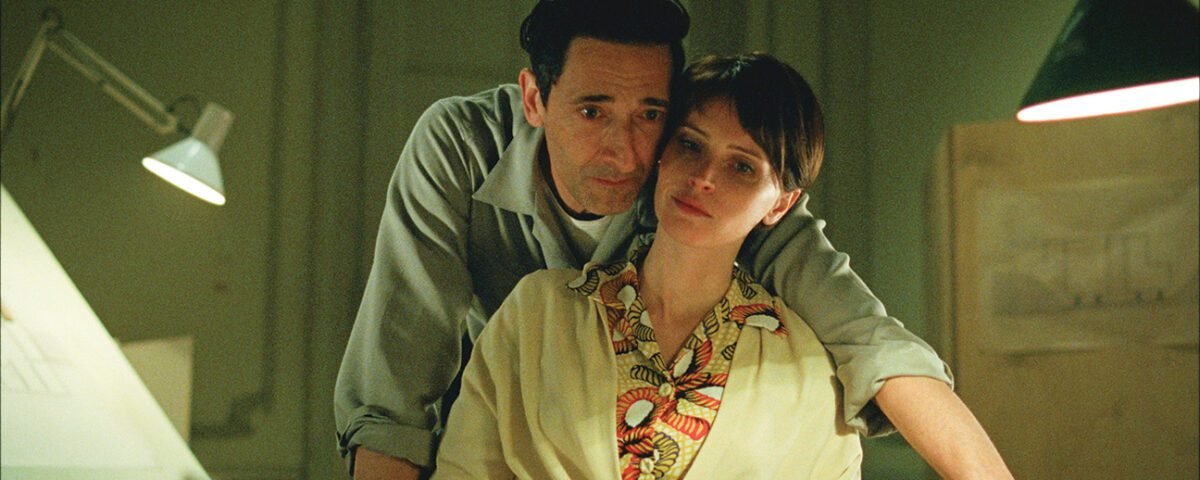


‘The End’ Review: Tilda Swinton and Michael Shannon in Joshua Oppenheimer’s Ambitious, Uneven Post-Apocalyptic Musical
September 12, 2024


‘Eden’ Review: Jude Law Leads a Starry Cast Marooned in Ron Howard’s Odd and Off-Putting Survival Tale
September 14, 2024Felicity Jones, Guy Pearce and Joe Alwyn also star in the epic story of a Hungarian Jewish architect who flees Europe after the war to build a new life in America.
The Brutalist
As bold and ambitious as the project it chronicles.
The past comes to life as a whole enveloping world in The Brutalist, Brady Corbet’s fine-grained, novelistic third feature as director, about a man of genius who gets to taste the American Dream but also feel the stinging humiliation of a conditional welcome that turns ice-cold. While there are echoes of The Fountainhead, this expansive story of a brilliant Bauhaus-trained Hungarian Jewish architect who survives World War II and starts a new life in Pennsylvania is a provocative original.
Reportedly the first American film fully produced in VistaVision since One-Eyed Jacks in 1961, it screens in its Venice Film Festival premiere in 70mm, a giant canvas amply justified by the narrative’s variegated textures.
Brody pours himself into the character with bristling intelligence and internal fire, holding nothing back as he viscerally conveys both exultant highs and gutting sorrows. His exacting accent work alone is a measure of his commitment to the audacious project.
The opening jolts us instantly into anxious involvement as László is jostled around in a packed train carriage, the shuddering sound design suggesting the nightmare of his ordeal. Over the turbulent strains of Daniel Blumberg’s mighty score, letters from the architect’s wife Erzsébet (Felicity Jones), from whom he was separated during internment, are heard in voiceover, detailing her situation in a displaced-persons camp in Hungary with László’s niece Zsófia (Raffey Cassidy). László is soon on board a ship bound for America, with plans for Erzsébet and Zsófia to follow.
Ellis Island arrival scenes are a staple of immigrant dramas, but the disconcerting angles from which DP Lol Crawley shoots the Statue of Liberty as it looms into view seem to presage both the elation of deliverance and the challenges to come. The blank stares of the assembled passengers barely able to follow instructions in English from port officials provide a haunting image of people for whom freedom comes with fear.
Potentially important new client Harry (Joe Alwyn) hires Miller & Sons to redesign the gloomy library in his family’s gated mansion as a surprise for his father, Harrison Lee Van Buren (Guy Pearce), away on business. Attila entrusts the project to László, and the architect takes on young Black single father Gordon (Isaach De Bankolé), whom he met on a mission breadline, as a construction hand. The architect’s perfectionism causes delays, but the resulting transformation creates a retreat of serenity and light, with the room’s valuable collection of first editions cleverly protected from damage.
Van Buren Sr.’s reaction is not the surprise his son intended. Unimpressed with the new library, he’s furious to find his house turned upside-down and “a Negro man” on his property, dismissing the contractors in a fit of bellowing rage.
When Harry refuses to pay due to roof damage, Attila blames his cousin. Audrey has already been nudging László to move out since a supposed transgression during a drunken evening at home. Attila uses that tension as further justification to kick him out. He lands in a shelter with Gordon, taking construction work to get by and using opium to numb the pain of his war injuries.





